Jennifer MacKenzie is an agricultural photo journalist with almost 30 year's experience. Operating from her base in Cumbria, Jennifer undertakes mainly industry-related freelance writing and photography.
Wild Geese scavenge grass
Wild geese are arriving in larger numbers for an extended winter season on valuable livestock grazing ground on the Cumbrian shores of the Solway Estuary.
The birds which once came in their hundreds now number thousands, eating off the first flush of spring grass for cattle and grazing ewes and their lambs as well as scavenging fields being conserved for silage.
 |
| David Bowe in a field which has been severely grazed by geese, he is showing the height he would have expected the grass to be by now |
The predominantly Greylag and Pinkfoot geese arrive on the south shore marshland in late September but as well as greatly increased numbers the birds are feeding on farmland neighbouring the marsh nearly into May when farmers are depending on the grass to grow.
Livestock farmer David Bowe is so exasperated with the invasion that he has applied for an out-of-season licence to shoot the birds but he fears an individual approach will only result in moving the problem elsewhere – if it is granted in time.
“The geese have always been coming here but whereas they used to number up to a couple of hundred they are now up to several thousand grazing one field,” said Mr Bowe who, with his brother Norman, has farmed at Calvo for 35 years.
“The open season when we are able to shoot the birds under a game licence runs from September 1 to January 31 and is extended on the foreshore to February 20 with the exception of Sundays.
“But it’s after that when the geese start grazing on the fields – just when the grass is starting to grow. They also seem to return in ever bigger numbers, particularly when the weather turns bad.”
There are also concerns at the level of fouling with droppings from the birds. A Rural Development Service advice note warns that the birds’ inefficient digestive system means they may produce droppings at the rate of one every six minutes.
The droppings contain bacteria that may be harmful, if swallowed, and may cause increased nutrient loadings is they are passed into water, it warns.
The Bowe family farms 300 acres in the area, among more than 3,000 acres run by numerous farmers on and near to the Skinburness, Calvo and Newton Arlosh marshes between Skinburness and Kirkbride.
Mr Bowe depends on the early grass in the fields for his flock of 200 Mule ewes and their Texel cross lambs as well as for his herd of 100 Friesian milkers plus 180 followers and beef cattle which includes pedigree Blonde d’Aquitaines.
“We lambed the ewes from February 26 in a couple of fields and around the beginning of March we intended to move them to another field to give them a fresh bite of grass but the geese had eaten most of it. It was after that I started trying to do something about the problem.
“We spread slurry on a field which is to be kept for silage and within six weeks when the grass started growing the geese were on it. We have to spread the slurry but we can’t spread it on the early grazing ground.”
Mr Bowe has been further frustrated with his attempts to get the out-of-season licence from Natural England and is not surprised that one of his neighbours gave up on the application which consists of a 10-page form and subsequently requires a count of the birds shot or scared away.
He made his first enquiries on March 13 and after two lots of correspondence from the Wildlife Licensing Unit at Westbury on Trym, near Bristol went astray he received a letter on March 22 saying that the unit aimed to process the application in ’15 or 30 days’. He received a visit on March 30 from one of its officers.
“There is quite a number of farmers affected by this. By tackling it individually we’re not solving the problem. No one knows why the geese are staying longer or why there are more of them.
“If the powers that be want to maintain the numbers then something should be done to help us cope with the situation. If not, then organised steps should be taken to keep them under control.”
No one at Natural England was available to make an official comment.

